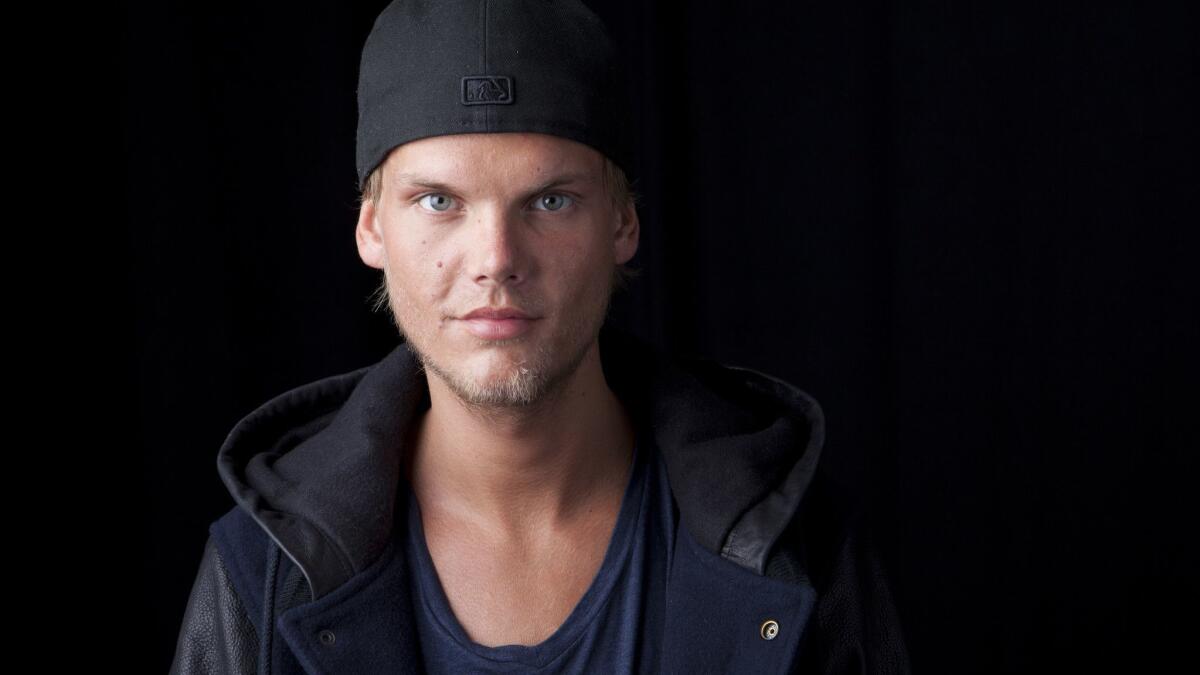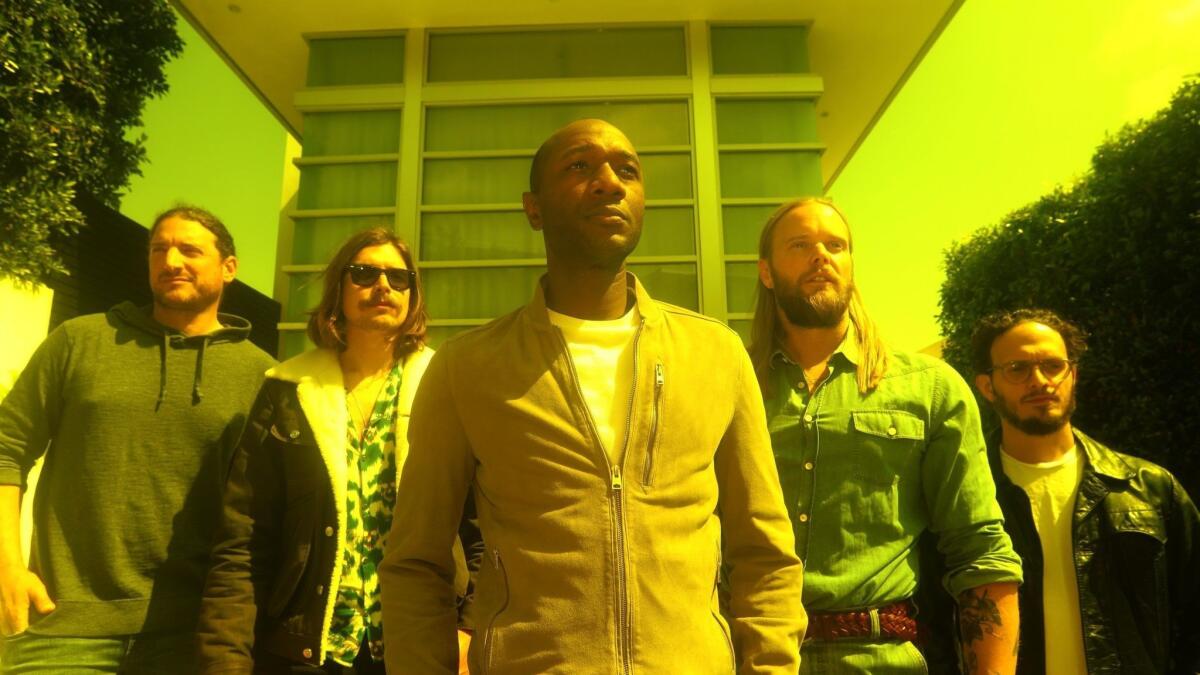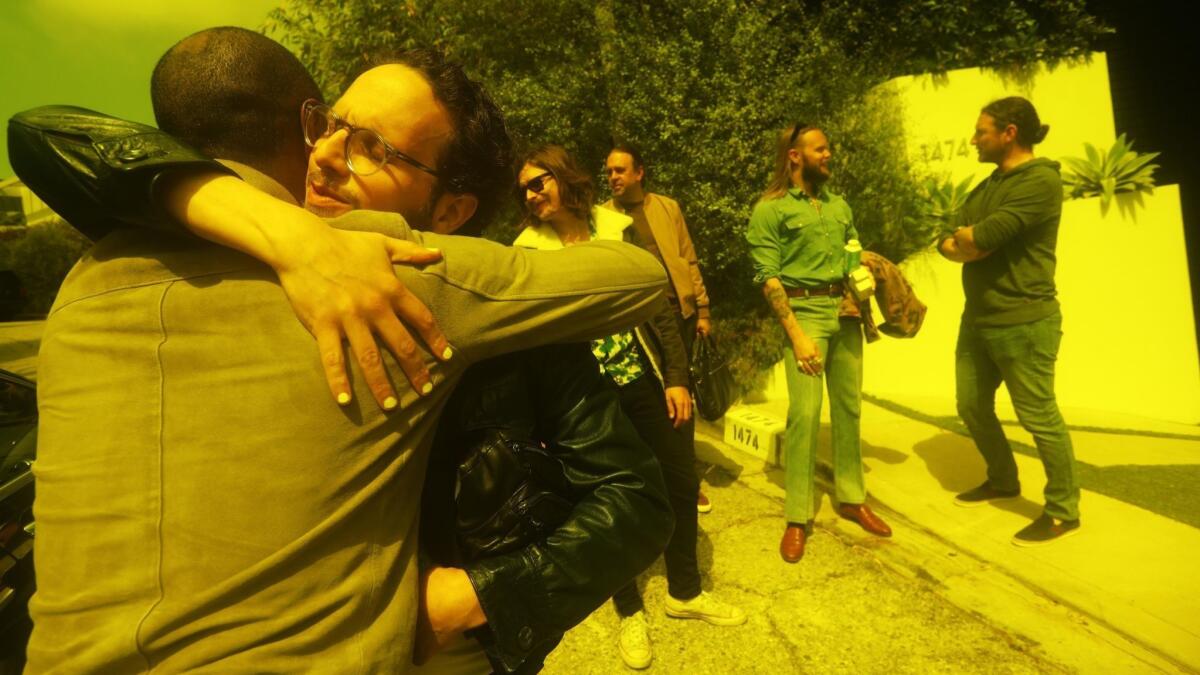Avicii’s final songs emerge on ‘Tim,’ with help from many friends

- Share via
At the top of the Bird Streets in West Hollywood, in front of a Modernist mansion with gobsmacking views of the Sunset Strip, Salem Al Fakir stepped out of his car and felt the loss all over again.
The Swedish producer and songwriter, 37, hadn’t been to this house, sheathed in blue glass and immaculate green hedges, in over a year. Not since he got the news of what happened last April to his friend Tim Bergling, the dance music artist known as Avicii.
Bergling lived and worked here until his suicide in Oman last spring at age 28. Al Fakir wrote and recorded with Bergling in this house. New owners had since moved in, but the memories of last year’s grieving welled up as soon as he saw it.
“I might need to take a step back,” Al Fakir said. “It’s a bit too much.”
Other friends and collaborators of Avicii’s pulled up: Al Fakir’s production partner Vincent Pontare; singers Aloe Blacc and Joe Janiak; Neil Jacobson, the president of Geffen Records, Avicii’s label. Jacobson hugged Blacc as he got out of his own car.
“Aloe, so good to see you,” Jacobson said. “This is nuts. It’s the first time we’ve been back here since.”
“I had created some sort of crust on the outside of my body,” he added. “You’re able to escape your own emotional moments. But this. … I’m having a hard time dealing with this.”

RELATED: Avicii’s memory lives on in ‘Heaven’ video tribute to the late DJ »
They’d gathered here to start talking about “Tim,” a posthumous album from the star Swedish DJ, songwriter and musician, finished by these collaborators based on his production notes. The album, out now, captures some of the last ideas from a young superstar producer, expanding on his gifts for melody and genre twists.
It would have an optimistic statement piece from Bergling, who had retired from touring after well documented struggles with substance abuse and mental health. But now it’s become an Avicii album for everyone left behind.
“We never expected what happened,” Janiak said. “I felt anxious, being a voice for that in some way. But there’s so much blank space that’s unfilled and so many things left unsaid. I think it should be filled by music. You want to be remembered for what made you feel alive.”
Bergling’s death was, in some ways, a valediction for the uplifiting, industry-shaking EDM scene of the 2010s. With his breakout single “Le7els” in 2011, Avicii helped define an era of mega-festivals like Electric Daisy Carnival, when DJs suddenly commanded mid-six-figures for gigs. He was parodied by Andy Samberg as DJ Davvinci on “SNL” (Bergling reportedly loved the skit).
But even in that heady era, Bergling stood out as a restless songwriter who pushed the boundaries EDM placed around him. One of his biggest hits came in 2013 with the folk-tinged “Wake Me Up,” with soul singer Blacc on lead vocals.
“This guy is one of the best melody writers, naturally from his soul, I’ve ever met in my life,” Chic founder Nile Rodgers told The Times last year (high praise from a man who collaborated with David Bowie and Daft Punk).
Bergling was candid about his problems with heavy drinking and mental health. In 2016 he retired from his relentless touring to focus on recovery and studio work. “The next stage will be all about my love of making music to you guys. It is the beginning of something new,” he wrote in a statement at the time. A documentary, “Avicii: True Stories,” came out on Swedish Netflix just days after his death and captured a deeply troubled star nearly broken by the stress of fame. But Bergling had approved of its candor, and he seemed to be rounding a bend in his recovery.
His suicide cut all that reinvention short.
The news devastated the dance and pop music communities, along with his family (he was survived by his parents and three siblings). While Bergling’s struggles were well-known, those who knew him personally didn’t expect anything like what happened.
“My conversations with Tim?” Jacobson recounted. “ ‘Hey buddy, what’s going on?’ ‘I’m doing great.’ ‘What are you working on? Let’s schedule a time next week for other sessions.’ ‘Oh, I can’t do it next week, I’m going to Oman.’ ‘What’s in Oman?’ ‘I don’t know man, I hear it’s beautiful.’ ”
Bergling sounded “jovial, happy,” Jacobson said. “I had no idea.”

After the funeral in Sweden, his closest collaborators were left with more than grief. They now had to decide what to do with the music.
With the blessing of Bergling’s parents, his management and label began sorting through his hard drives and Dropbox accounts. Bergling would often leave detailed voice notes and sketches about his intentions for the tracks, which added some clarity. Many were almost complete productions.
But even if it promised a final chance for new Avicii music, it was emotionally trying work.
“After Tim passed away, Tim’s father asked me, ‘Can you please go through Tim’s devices and see if you find any clues about the music?’ ” said Christopher Thordson, who managed Avicii after Bergling retired from touring. “What happened, obviously, it’s so sad and tragic. I couldn’t listen to his demos for a couple of days after his passing. You’d just burst into tears listening to it. It’s been a lot of sleepless nights.”
Jacobson said: “We all had a series of some of the hardest conversations one can have, talking to a father who buried his son about his family’s wishes. But we knew the facts. We knew Tim, and we knew there was music he wanted to share.”
Based on those notes and about 200 demos, a picture began to emerge for a coherent album. Some of Bergling’s ideas came as total surprises to his eventual collaborators. “Tim hadn’t even mentioned [it] to me, but he had already started it and finished it and already had a demo and everything,” Blacc said, of “SOS,” their latest collaboration. “Somewhere in there he had my name listed.”
“Tim,” the album gleaned from these sessions, showcases Avicii’s wide ambitions and pop songwriting prowess beyond EDM.
Some singles like Janiak’s “Bad Reputation” have a heavy, humid dancehall lilt; “Heart Upon My Sleeve” returns to folk with alt-rockers Imagine Dragons taking lead on the vocals. Al Fakir and Pontare’s production team, Vargas & Lagola, helm some unexpected Indian string flourishes on “Tough Love” and eerie trip-hop on “Excuse Me Mr. Sir.”
It would have been a major reset of Avicii’s sound, one that could have cemented him in the upper tier of contemporary pop producers. EDM’s high-energy, four-on-the-floor beat has fallen out of fashion in pop, and this album would have fully left it behind.
But it’s also hard not to hear a dark undercurrent in many of the lyrics. “Can you hear me? S.O.S. / Help me put my mind to rest / Two times clean, I’m acting low / a pound of weed and a bag of blow,” Blacc sings on “SOS.” On “Bad Reputation,” Janiak channels the anxiety around Bergling’s public perception as a hard-partying embodiment of EDM decadence.
Those songs, though dark and self-critical, were written at a moment of relative peace for Bergling, at least as his collaborators saw them. Under different circumstances, they might have been praised for their candor about his struggles. Now, their singers admit that they’ve taken on heavier meanings. They felt that weight performing them.
“Singing those lyrics really shook me,” Blacc said. “But it made me humble and I felt the gravity of what I was endeavoring to do. Knowing that he was crafting the words, and hearing this call for help and hearing this affirmation of ‘I don’t need my drugs,’ that all was really tough to take.”
They also reminded everyone in Bergling’s circle that no one can really know what someone’s going through. His management and label admit that his death has changed the ways they prioritize artists’ health.
“That’s something I’ve been thinking very much about,” Thordson said. “Mental health has been overlooked in the industry. It’s the industry’s responsibility to provide a safe work environment. You need to have some boundaries when it comes to touring. For some people, it’s completely fine to handle the stress that comes with that. But not everyone.”
For fans, the range on “Tim” will remind them of the talent and expansive vision underneath Avicii’s EDM ascent. For the industry, it’s also a stark reminder of the human costs and pain behind the jet-set Instagrams that drive this new era of hyper-visible life as an artist.
And for those who combed his Dropbox files and did their best to finish what Bergling started, it’s a sense of closure. One last session in that house in the Bird Streets.
“All of our friends are under so much pressure,” Janiak said. “You forget to just be a human. I remember Tim asked me, ‘What do you do?’ ‘Well, I write songs.’ ‘No, what do you actually do?’ I said, ‘Well, I like digging holes and gardening and stuff,’ And he was like, ‘Yeah! Yeah!’ He was still trying to figure that out. If you can’t exist as a human, it doesn’t mean anything.”
For breaking music news, follow @augustbrown on Twitter.
More to Read
The biggest entertainment stories
Get our big stories about Hollywood, film, television, music, arts, culture and more right in your inbox as soon as they publish.
You may occasionally receive promotional content from the Los Angeles Times.











